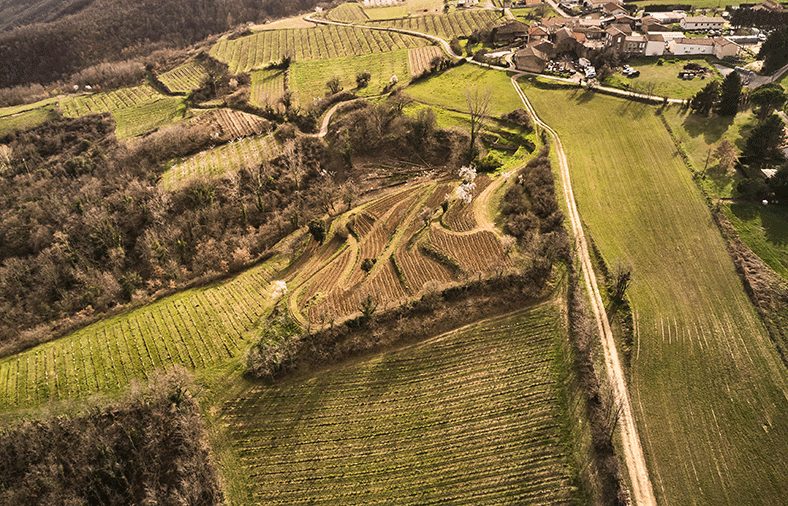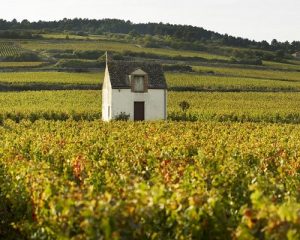
Another domain has joined our network of partner estates! La Ferme des 7 Lunes can be translated as ‘Seven Moons Farm’…dreamy, right? A bit woo-woo too, perhaps. In any case, this family-owned domain in Saint-Joseph produces delicious organic and natural wines with gorgeous balance.
La Ferme des 7 Lunes is found in the Ardèche region, between Vienne and Valence, and its wines are produced in the Saint-Joseph appellation. Jean Delobre has been running the estate since 1984, representing the third generation of his family to work this land. At the start of its life, this domain was already a proponent of polyculture, when a variety of plants including fruit trees, grains, and wild flowers grow alongside the vines. For quite a long time, the domain gave its grapes to a cooperative, until Jean made the decision in 2001 to change his way of doing things. Breaking away from the cooperative system, he threw himself into the challenge of solo vinifications. It all began with putting some vats in a disused barn, and the rest is history!
Jean had in fact left the cooperative at the same time as a friend, and they provided each other with mutual support during the rocky transition. At this time, he did have some viticultural training under his belt, but he told us how this had taught him ‘everything not to do, as is often the case with this kind of training’. Moving away from the cooperative was a huge step, then, as vinifying had previously been nothing more than a hobby Jean attempted from time to time. In 2017, he got together with his friend Jacques Maurice, and they founded a company to vinify and sell their wines.
The craft is in the vineyard
The vineyard covers around ten hectares of land on the beautifully terraced slopes of the Rhône. Around half of the vines are Syrah grapes, the rest being a variety of Gamay, Viognier, Marsanne, and Roussanne. In line with local tradition, the vines are planted on canes, but they aren’t trimmed; each vine becomes attached to its neighbour, forming a kind of chain.
La Ferme has had its organic certificate since 1997, having already undergone a conversion whilst part of the cooperative. This is a classic kind of organic viticulture, with a small amount of sulphur and coper used; there is a good breeze in the area and the soil filters well, meaning that the chances of a disease like mildew developing are much lower. For example, last year was one of high probability for disease in the vineyard, and the domain used around 1.9kg of copper per hectare, with the maximum dose being 4kg per hectare.
Generally speaking, the domain’s most fundamental actions take place in the vineyard. ‘We spend a lot of time with the vines to carry out all the work and manage production levels. Our wine is made much more in the vineyard than in the winery, and the goal is to grow grapes that are high-quality and healthy. This means we intervene as little as possible during vinification.’ The harvest is always a delicate moment, as any over-ripeness would take away from the wine’s freshness.
Very little work is carried out on the soil, and this is on purpose. The domain is one of many to question the method of ploughing in the vineyard, so they only go as far as controlling grass growth and lightly raking the soil three times a year. There are several reasons for this choice, mainly environmental and financial: ‘We’ve realised that ploughing isn’t the best for keeping carbon in the soil, and taking the tractor through is costly. Ploughing less also gives us more time for other work’.
There has also been an interest in agroforestry, with the domain planting bushes as a way to stimulate biodiversity.
Natural and delicate vinification
Much about the vinification process is classic. The white grapes are pressed and fermented in vats or casks depending on the cuvée. The red single-variety wines are either pressed in whole clusters or destemmed, and they spend between a week and ten days in the vat before maturing in stainless steel. The Saint-Joseph wines tend to come from destemmed grapes and the vatting is longer – around three weeks – before maturing in casks and demi-muids.
Generally, the extraction is delicate, following the infusion method. Jean explains: ‘We’re lucky that the Syrah grape lends itself to a lighter, fruitier wine as well as more structured cuvées. We follow both of these approaches. It’s nice to make easy-drinking wines, and even in the cellaring cuvées we like to keep some fruit and freshness; this is our signature characteristic. The Saint-Joseph wines should have a bit more texture to them, but the vinification is still gentle: we don’t over-extract, pumping up is really careful, and the grapes macerate gently, too. We don’t want to force it by extracting tannins at all costs, rather we want something noble. In their youth, the wines are fruitier, but they still have excellent aging potential.’
And are there any additives? Very very few at La Ferme des 7 Lunes! Several of their cuvées don’t see a single gram of sulphur, whilst others have a tiny dose added. So tiny, in fact, that just a few months after bottling, the sulphur is undetectable. The wines are not fined or filtered.
You can find the full selection of wines from La Ferme des 7 Lunes here



